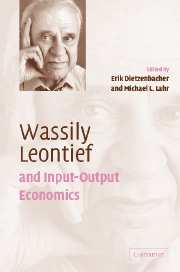Book contents
- Frontmatter
- Contents
- List of contributors
- List of figures
- List of tables
- Preface
- Part I Reflections on input-output economics
- 1 A portrait of the master as a young man
- 2 Leontief's “magnificent machine” and other contributions to applied economics
- 3 Leontief and the future of the world economy
- 4 International trade: evolution in the thought and analysis of Wassily Leontief
- 5 Leontief's input-output table and the French Development Plan
- 6 Leontief and dynamic regional models
- 7 Experiences with input-output and isomorphic analytical tools in spatial economics
- 8 Leontief and Schumpeter: a joint heritage with surprises
- 9 Some highlights in the life of Wassily Leontief – an interview with Estelle and Wassily Leontief
- Part II Perspectives of input-output economics
- Subject index
- Author index
2 - Leontief's “magnificent machine” and other contributions to applied economics
Published online by Cambridge University Press: 22 September 2009
- Frontmatter
- Contents
- List of contributors
- List of figures
- List of tables
- Preface
- Part I Reflections on input-output economics
- 1 A portrait of the master as a young man
- 2 Leontief's “magnificent machine” and other contributions to applied economics
- 3 Leontief and the future of the world economy
- 4 International trade: evolution in the thought and analysis of Wassily Leontief
- 5 Leontief's input-output table and the French Development Plan
- 6 Leontief and dynamic regional models
- 7 Experiences with input-output and isomorphic analytical tools in spatial economics
- 8 Leontief and Schumpeter: a joint heritage with surprises
- 9 Some highlights in the life of Wassily Leontief – an interview with Estelle and Wassily Leontief
- Part II Perspectives of input-output economics
- Subject index
- Author index
Summary
Introduction
Wassily W. Leontief was an excellent theorist. As I note below, others have reviewed his extensive contributions to economic theory. In this paper, I focus instead on the many major contributions to applied economics he made by conducting detailed empirical analyses. He was often ahead of his time, especially by sensing that computers would soon be able to handle the difficult and complex empirical studies he kept saying needed to be done. I begin with a brief review of his most important empirical contribution, namely the development and extensions of the input-output model. Then I discuss five areas of applied economics in which he made an innovative set of insights: (1) automation; (2) disarmament; (3) the environment; (4) foreign and interregional trade; and (5) spatial and world analyses. In each area of study, he usually constructed a novel framework in which to conduct a unique analysis.
Linking theory and applications
One of Leontief's major contributions to economics, of course, was to economic theory. Others (e.g. Dorfman, 1973; Carter and Petri, 1989) have discussed most aspects of his theoretical work, so I will not focus on them here. In order to understand his contribution to applied economics, I do review his important thinking on linking theory and applications. He mentioned this link in many of his articles, feeling it was critical for superb economic analyses. As recently as 1998, Leontief stated: “My tendency was to combine empirical and theoretical.”
- Type
- Chapter
- Information
- Wassily Leontief and Input-Output Economics , pp. 9 - 29Publisher: Cambridge University PressPrint publication year: 2004
- 12
- Cited by



